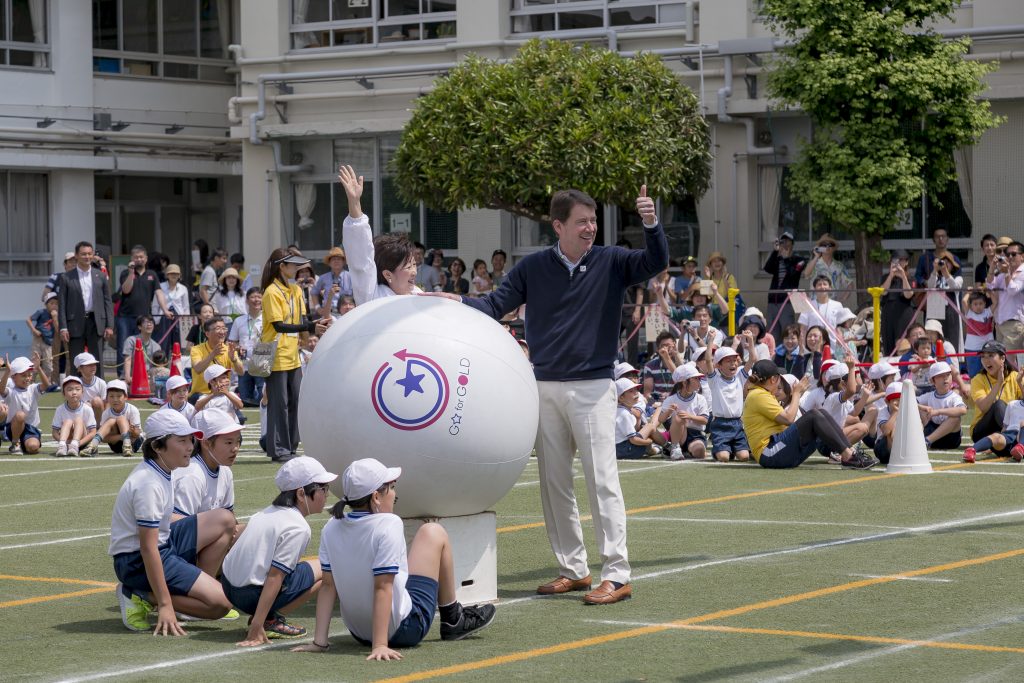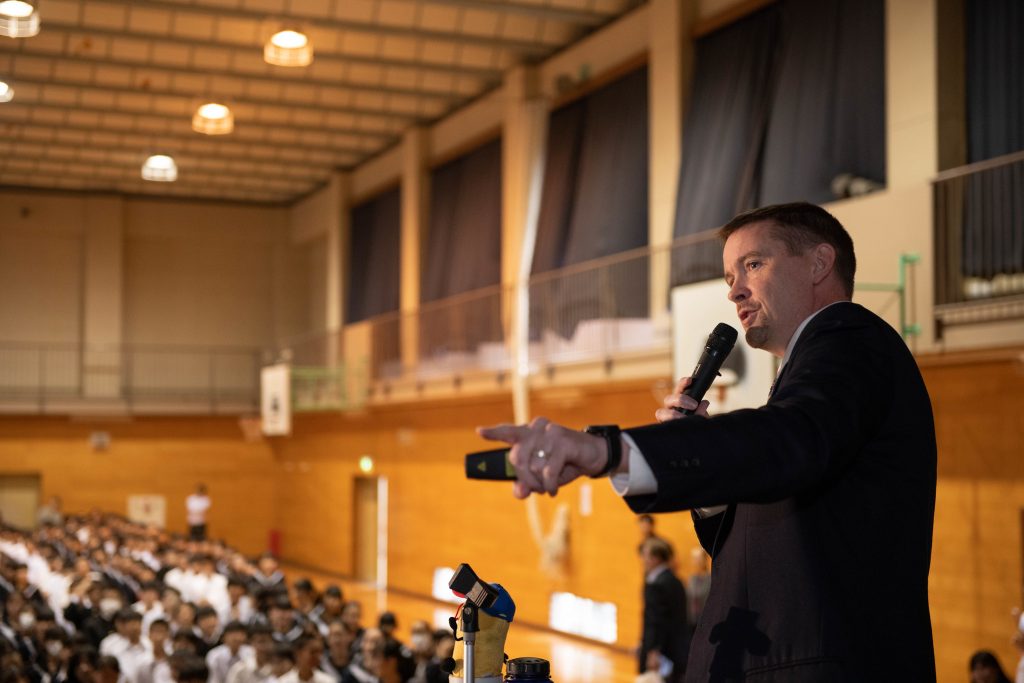As Tokyo prepares to host the 2020 Tokyo Olympic and Paralympic Games, the U.S. Embassy in Japan has been conducting a campaign called “Go for Gold” to enable Japanese students to interact with American diplomats and learn more about the United States. The Embassy plans to engage with up to 338 elementary, junior high, and senior high schools in Tokyo by 2020 through the campaign.
Starting point
The Go for Gold campaign was established in conjunction with the Tokyo Metropolitan Government Board of Education’s “Global Friendship Project.” This project encourages students to engage with the international community by selecting countries that will participate in the 2020 Games and studying their culture and languages. The number of schools that signed up to learn about the United States through the project totaled 338, including schools for students with special needs.
Go for Gold is administered by the Public Affairs Section at the Embassy, which counts promoting understanding of the United States among its missions. The Embassy decided to launch Go for Gold because it recognized that partnering with Tokyo on the Global Friendship Project would be an extremely valuable opportunity for a large number of students to learn about the United States. On June 2, 2018, Tokyo Governor Yuriko Koike and U.S. Ambassador to Japan William Hagerty participated in a sports day event at an elementary school taking part in the program and held a ceremony to mark the launch of the campaign.

U.S. Ambassador to Japan Bill Hagerty and Tokyo Governor Yuriko Koike participate in a "Go for Gold" launch event at Sukegari Elementary School
“In English, ‘Go for Gold’ means to strive for the best possible outcome or result,” said Ambassador Hagerty in a speech at the Japan National Press Club on November 16, 2018. “We believe the best possible outcome of the Tokyo 2020 Games – apart from being a spectacular global sporting event, which I’m sure it will be – would be a renewal of the strong personal ties that connect the people of Japan and America, and Go for Gold is our exciting new program making that possible.”
Ambassador Hagerty views the 2020 Olympics and Paralympics as a new opportunity to bring the people of Japan and the United States together. Consequently, Go for Gold has now become one of the Embassy’s flagship programs.
Three pillars
The Go for Gold campaign primarily consists of school visits by diplomats, training programs for English teachers, and interactive events with Olympic and Paralympic athletes.
For the school visit program, diplomats visit participating schools to give presentations on the United States and answer questions from students. The diplomats focus on a wide range of topics, but many of them are especially eager to talk about U.S. geography, culture, and education, as well as the Olympics.
In addition to diplomats from the Public Affairs Section, many staff members from other sections have also participated in the school visit program. Last October, Information Management Officer Kevin Rubesh visited Shakujii Junior High School in Tokyo’s Nerima Ward. After being welcomed by more than 700 students waving American flags, he talked about his home state of Oregon, his active American high school life, and his career as a diplomat. Although the students seemed nervous during the presentation because they weren’t used to listening to English, many of them raised their hands to ask questions afterward. When Rubesh left the venue, they saw him off with a standing ovation.

U.S. Embassy Tokyo Information Management Officer Kevin Rubesh speaks at a "Go for Gold" event at Shakujii Junior High School
The role of diplomats at the U.S. Embassy is to serve as a bridge between the United States and Japan, but they end up spending a lot of time working inside the building or interacting with government or business officials. The school visit program provides valuable opportunities for diplomats to get outside and meet face-to-face with Japanese young people.
“Our mission as American diplomats is to promote American culture and mutual understanding,” says Cultural and Sports Attaché Michael Turner, who manages the Go for Gold program. “What we want out of this program is to actually talk to a group of people that we seldom get to talk to – kids.”
The Go for Gold campaign also involves training for local English teachers. With a grant from the Public Affairs Section, Akita International University in Akita Prefecture has been holding seminars on English language instruction since last year. The seminars are designed for English teachers at elementary and junior high schools and are scheduled to continue for a period of two years. Last year, when teachers were selected from across the nation to take part in intensive three-day courses in Sapporo, Tokyo, and Nagoya, seven teachers from schools participating in the Go for Gold program attended the Tokyo seminar. When the seminars are held again this summer, more teachers from Go for Gold schools are expected to participate than last year.
In addition to providing training, the Embassy distributes free English education materials for both students and teachers developed by the U.S. Department of State. These materials are used for the school visit program as well.
The Embassy also invites American Olympic and Paralympic athletes to participate in Go for Gold events when they come to Japan for competitions and tours. The American athletes are eager to visit schools and communities in Tokyo and interact with local students. At the events, top athletes give presentations and provide practical training to Japanese young people.
When Olympic swimming champion Katie Ledecky visited Tokyo in August 2018, she met with local students at a Go for Gold event. In addition to leading a clinic for more than 100 young Japanese swimmers at a pool in Tokyo, she gave a speech in which she spoke about being reunited with her childhood hero at the Olympics and inspired the students by saying that she might end up competing with some of them someday. Through these kinds of programs, the Embassy aims to convey to Japanese young people the importance of setting high goals and aspirations for themselves like Olympic and Paralympic athletes do.
Olympics and beyond
The Embassy hopes that the Go for Gold program will encourage more Japanese young people to travel to the United States in the future. Increasing numbers of Americans are studying in Japan or learning the Japanese language recently thanks to the Japanese government’s “Cool Japan” strategy. It would be ideal if more Japanese students also studied in America. The friendly ties between the United States and Japan will grow stronger if Americans and Japanese are able to better understand each other through study abroad and other international exchange programs.
The Go for Gold campaign is geared toward the Tokyo Olympics and Paralympics in 2020, but what will become of the program after the games end?
“Go for Gold may be an Olympic program but it’s not going to finish when the closing ceremony happens in 2020,” assures Cultural and Sports Attaché Michael Turner. “We want to make sure that the relationships we’re building now continue into the future.”
The United States and Japan will keep pursuing various types of exchanges even after the Tokyo Olympics and Paralympics in 2020. All of us at the U.S. Embassy are sincerely looking forward to seeing you at one of our events in the future!







COMMENTS1
From a foreign policy standpoint its evident Japan wants relations with the United States. Current instability on the Korean peninsula and the sudden rise of China’s military power have put Japan in a position where it wants the United States’ help in case of an emergency.
LEAVE A COMMENT
TOP